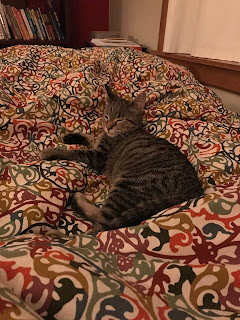It is said that it takes 10,000 hours to "master" something... I can confidently say that I qualify as a Master of Naps.
"That feeling."
 |
| Homemade pin, courtesy of my sister. |
We all know how it feels when a nap attack is about to occur. It often begins with a subtle headache behind heavy eyes, mind fogginess, and yawning. If you're REALLY overtired, you may experience some mild nausea and muscle weakness. All of the sudden you feel a wave of desire to lie down wash over you and, depending on your will power, you may try to sneak a power nap in public. For some like me, once that feeling hits, taking a nap is our only solace.
Top 3 causes of a Nap Attack
1. You're actually tired. Whether you've had a few nights of inconsistent sleep, or you didn't get your usual 8 hours of recommended shut-eye the night before, your body tries to make up for the restorative sleep you lost pretty much right away. In some cases, you may feel fine the day after a poor night of sleep, only to find yourself experiencing nap attacks the next day. The moral of the story is this:
Figure out how much sleep YOU need to feel rested (for most people, this number is between 6 and 9 hours), and try to head to bed and wake up at the same times each day. Regulating your sleep pattern is an excellent defense against nap attacks.
2. You just ate a big meal. Food comas are so real, people. Unless you are uncomfortably full to the point of nausea or discomfort, most people have experienced a nap attack after a big meal. If the meal you just ate was high in fat, carbs, and/or sugar, you've got the recipe for a food coma. These foods trigger a response in our sympathetic nervous system that basically tells our bodies to slow down and focus on digestion.
3. Anxiety and/or depression. Excessive daytime sleepiness often accompanies a crummy emotional state, and can sometimes begin a vicious cycle of unproductive days followed by guilt, followed by more napping. In my experience, a nap is a great escape from anything that might be stressful in my daily life. In college, I spent many days and nights napping between classes and assignment that I was anxious to complete, which lead to a whole lot of procrastination. Waking up from an anxiety nap is a RUDE awakening that sort of defeats the purpose of taking the nap in the first place.
Napping and depression unfortunately go hand in hand as well. Besides using a nap as avoidance, depression is absolutely exhausting and causes a lot of daytime sleepiness. I'm sure there are biological and psychological reasons for this, many of which are still being examined by researchers all over the damn place.
The venue
Hoooooookay, on a more positive note, the VENUE in which you choose to nap can make or break your napping experience. Attempting to nap somewhere that is noisy or uncomfortable usually results in a bunch of wasted time, and may leave you feeling more sleepy. If possible, find somewhere quiet, dim, and cool for your nap. Foam earplugs are a great investment. The quicker you fall asleep, the quicker you can wake up and return to your day feeling refreshed.
If you feel the need to nap in public or at work, try to find a relatively private space where you won't be bothered. Be sure your valuables are secure so that you won't have anything to worry about while falling asleep. If you can't find anywhere suitable and you're in desperate need of a power nap, I suggest closing yourself in a bathroom stall, sitting down, and resting your head in your hands for 10 minutes. It sounds a little nutty but trust me, it'll stave off a nap attack for quite some time.
Naps are an incredible way to reset your body and mind throughout the day. As with most great things, moderation is key. A 30 minute nap will do you a lot more good than a 3 hour one, in most cases.
Naps are an incredible way to reset your body and mind throughout the day. As with most great things, moderation is key. A 30 minute nap will do you a lot more good than a 3 hour one, in most cases.
Happy napping!
 |
| Claudio, my new nap buddy. |








